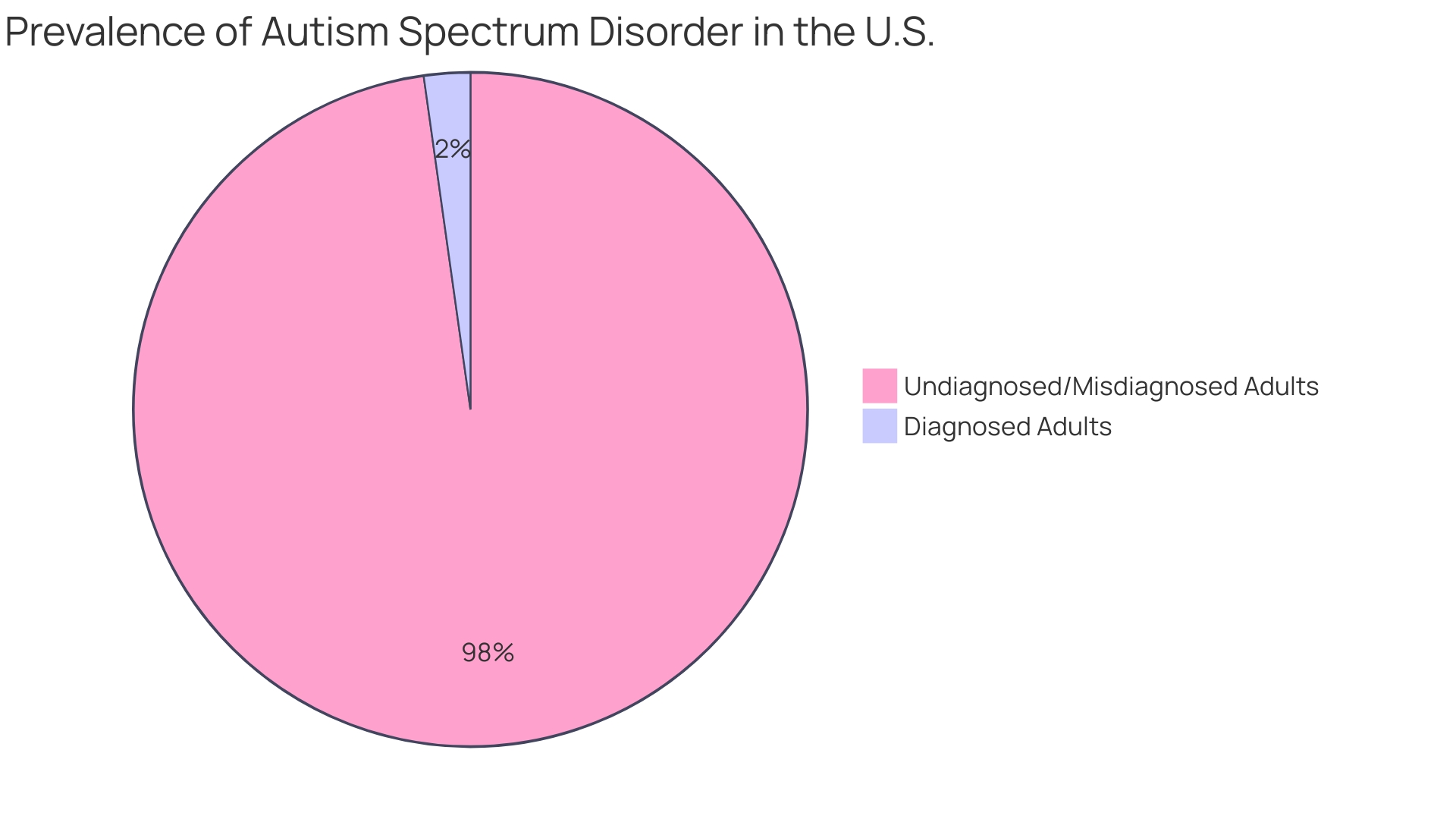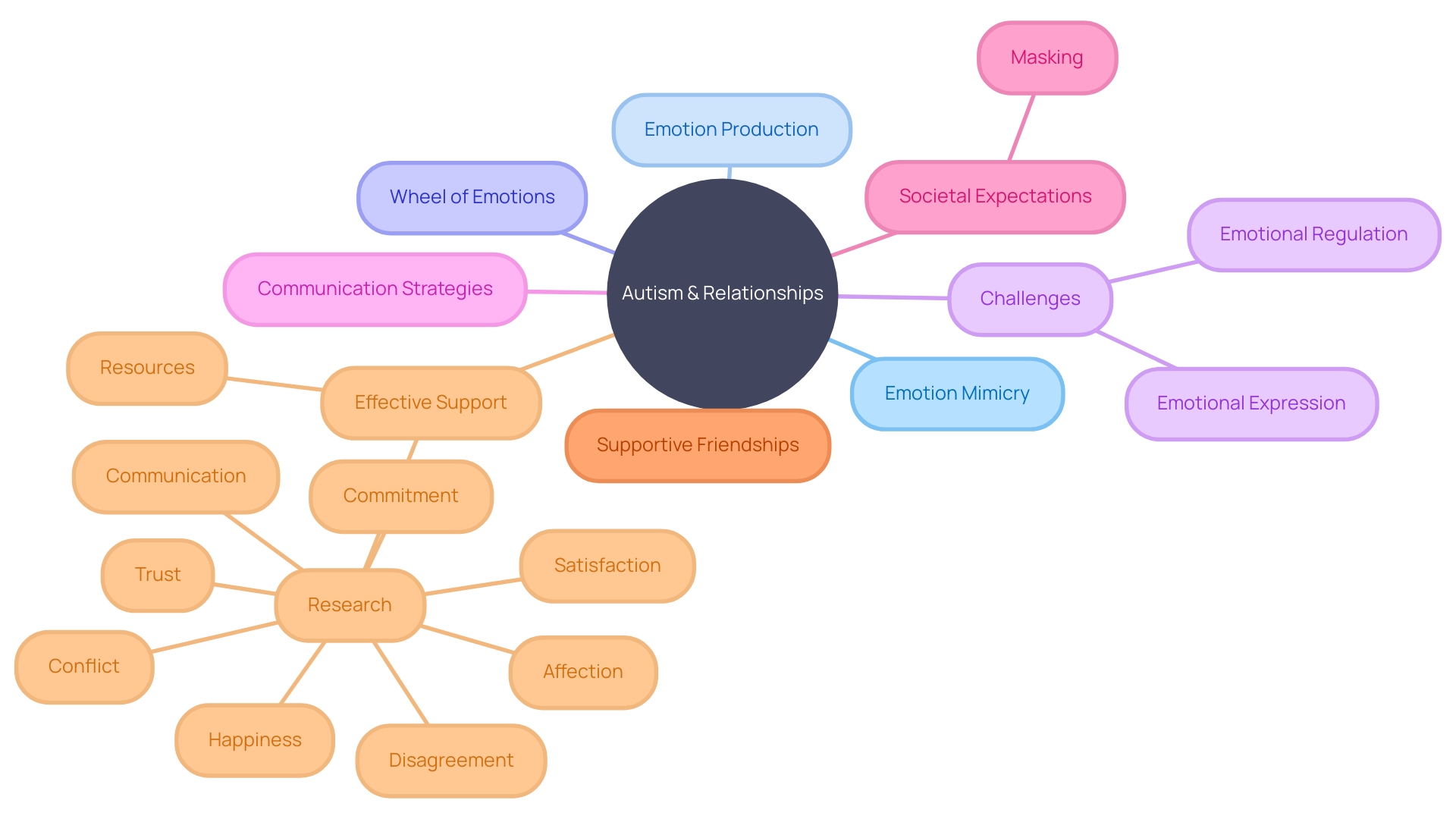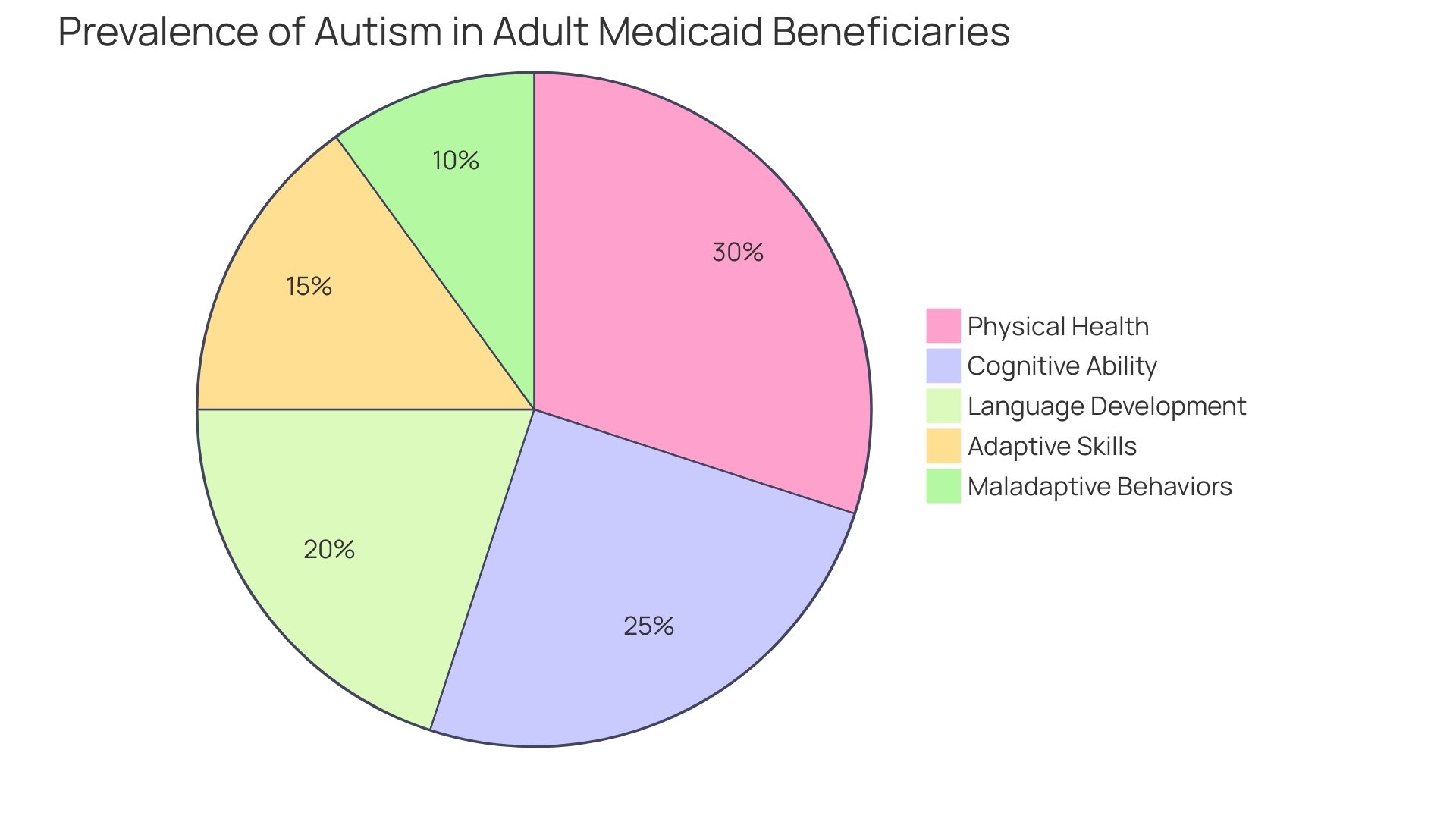Introduction
Season 2 of "Love on the Spectrum US" offers an intimate and authentic look into the world of dating and intimacy for individuals on the autism spectrum. This groundbreaking series goes beyond the search for a partner and dives into the personal growth, self-esteem building, and intricate dynamics of human connections. By showcasing genuine experiences and celebrating neurodiversity, the show fosters empathy and challenges the underrepresentation of people with disabilities in the media.
As viewers embark on this heartfelt journey, they gain insights into the rich and complex lives of adults on the spectrum, filling a void in our understanding of their lifelong journey. Moreover, the series aligns with the growing inclusivity trend in disability dating sites, reflecting a society that values diversity in love and companionship. With a confident and empowering tone, "Love on the Spectrum US" serves as a guide for both participants and viewers, highlighting the importance of clear communication and setting boundaries for successful relationships among autistic individuals.
Above all, this series is a celebration of individuality, a lesson in empathy, and a beacon of inclusivity in the pursuit of love—a universal aspiration.
Understanding Love on the Spectrum US Season 2
Season 2 of "Love on the Spectrum US" continues to break new ground by showcasing the heartfelt journeys of individuals with autism as they explore the world of dating and intimacy. This season offers an even closer look at the personal stories of its participants, revealing their aspirations for love and the unique challenges they encounter along the way. It's not just about finding a partner, but also about personal growth, building self-esteem, and navigating the delicate intricacies of human connections.
The series is lauded for its authentic representation and celebration of neurodiversity, countering the media's frequent underrepresentation of people with disabilities. By focusing on genuine experiences rather than competition or manufactured drama, the show resonates with viewers, fostering empathy and a deeper appreciation for the autism community.
The importance of this representation is underscored by the stark reality that research on autistic adults, particularly in their middle and later years, is scarce. Studies tend to concentrate on childhood and adolescence, leaving a gap in our understanding of the lifelong journey of autistic individuals. With each episode, the series contributes to filling this void, offering insights into the rich, complex lives of adults on the spectrum.
Moreover, the series aligns with the evolving landscape of disability dating sites, which are increasingly becoming inclusive platforms that cater to the needs of individuals with disabilities. These sites aim to create safe spaces for sharing stories, fostering connections, and building relationships, much like the intent of "Love on the Spectrum US." With the online dating market projected to grow significantly, the trend towards inclusivity is clear, reflecting a society that values diversity in love and companionship.
As the series unfolds, viewers witness the pivotal role of clear communication and setting boundaries, essential aspects that Dr. Sultan highlights for successful relationships among autistic individuals. The show's candid portrayal of these strategies in practice offers a guide not just for participants, but for viewers to understand the importance of these elements in nurturing healthy relationships.
In essence, "Love on the Spectrum US" is more than a series about dating—it's a celebration of individuality, a lesson in empathy, and a beacon of inclusivity in a world where the pursuit of love is a universal aspiration.
Exploring the Challenges of Social Interaction and Dating
Love on the Spectrum US Season 2 delves into the world of dating as experienced by those on the autism spectrum, presenting the audience with a candid look at the social challenges they may encounter. From reading subtle social cues to interpreting non-verbal communication, the series sheds light on the complexities autistic individuals navigate in romantic relationships. It's not just about finding love; it's a journey that underscores the importance of self-esteem and confidence, deeply resonating with the comprehensive approach of the Empowering Healthy Relationships for People with Disabilities curriculum. This curriculum, accessible through a membership, offers extensive resources including video lessons and worksheets designed to enhance decision-making and problem-solving in relationships, particularly for those with disabilities.
The show echoes the sentiments of experts who underline the minimal research on autistic adults, despite a staggering increase in autism diagnoses, now estimated at 1 in 36 children. Dr. Gregory Wallace, an associate professor at The George Washington University, emphasizes the scarcity of knowledge regarding the lives of autistic adults, particularly as they transition from young adulthood to middle and older age. This gap highlights the necessity of programs and studies that continue beyond the childhood years.
Moreover, the series aligns with the advice given by professionals at Newsweek's 'What Should I Do?' column, where experts tackle readers' personal dilemmas. The column stands as a testament to the importance of expert guidance in navigating relationships and life's challenges. It's a sentiment also shared by Dr. Sultan, who recommends establishing clear boundaries and guidelines to reduce the uncertainties that come with the unpredictable nature of dating, echoing the strategies employed by some autistic individuals to 'fit in' through compensation, as they adapt to societal norms that often clash with their natural way of being.
Love on the Spectrum US Season 2 not only entertains but also educates, providing viewers with a deeper understanding of autism and the art of forming connections, while continually challenging conventional wisdom and fostering empathy.

The Role of Shared Interests in Building Connections
In the heartfelt journey of 'Love on the Spectrum US Season 2,' viewers are given a unique insight into the significance of shared interests as a cornerstone for nurturing connections in the autism community. The series brings to light how individuals with autism, like Martin Tran, find a sense of belonging and understanding through common passions, such as his love for literature which provided him with solace and a pathway to personal development despite the challenges he faced.
James' story further reinforces this narrative, demonstrating that a shared hobby, like his affinity for art and collectibles, not only offers an avenue for self-expression but also serves as a bridge to connect with others. Similarly, Alex Schlueter’s artistic talents highlight how personal interests can be deeply integrated into an individual's identity, shaping their life choices and relationships.
News of initiatives like Emirates' effort to create inclusive flying experiences for neurodivergent individuals, including superfans like Humza, underscores the importance of accommodating and celebrating the diverse interests of those on the autism spectrum. Such endeavors echo the series' message that shared interests are not just about mutual hobbies; they are about creating spaces where individuals can feel understood and valued.
The series stands as a testament to the resilience and diversity of the human spirit, showcasing that when individuals on the spectrum are supported in pursuing their interests, these passions can form the bedrock of meaningful connections and a fulfilling life.
Navigating the Complexities of Expressing Feelings and Emotional Intensity
Season 2 of Love on the Spectrum US continues to break new ground by delving into the emotional tapestry of dating and relationships among individuals on the autism spectrum. This season, viewers get a closer look at the nuances of 'emotion mimicry' and 'emotion production,' emphasizing the importance of these skills in conveying and interpreting feelings within romantic connections. The series shines a light on the often underappreciated complexity of emotions, referencing the Wheel of Emotions, which expands upon Ekman and Friesen's foundational work by introducing primary and secondary emotions, thus providing a more intricate understanding of emotional states.
Challenges in emotional expression and regulation are not uncommon on the spectrum, necessitating strategies to foster better communication. This can include setting clear boundaries or developing a mutual understanding of communication styles, as highlighted by Dr. Sultan's insights into the benefits of structure and routine. Indeed, emotional intelligence plays a critical role in navigating relationships, with emotion recognition and regulation being key components that can be enhanced through various techniques.
The show doesn't shy away from addressing societal expectations and the cultural context of emotional expression. It acknowledges the exhausting nature of 'masking'—where autistic individuals may conceal their authentic selves to fit in—and the journey towards embracing one's unique traits. Amidst these personal transformations, the series underscores the value of supportive, long-standing friendships and the emotional resiliency they provide.
With 1 in 45 adults in the U.S. diagnosed with autism, Love on the Spectrum US Season 2 provides a crucial platform for fostering understanding and acceptance. It also reflects the continuous need for effective support and resources, as evidenced by initiatives like the Kevin and Avonte Program, which aims to protect and support the autism community, especially in critical situations like wandering.
Through a blend of personal stories, expert commentary, and research-informed perspectives, Love on the Spectrum US Season 2 offers an enriching exploration of the intersection between autism and emotional dynamics in romantic relationships.

Strategies for Successful Dating and Relationships
Season 2 of Love on the Spectrum US delves into the complexities of dating and relationships for individuals with autism, exploring the nuances of social connections that many of us take for granted. With a prevalence of autism diagnoses among children now estimated at 1 in 36, it's clear that the need for understanding and support in adult life is more critical than ever.
This season, the series not only entertains but also educates, drawing on the valuable insights of a curriculum tailored for people with disabilities called Empowering Healthy Relationships. This curriculum underscores the importance of self-esteem, confidence, and problem-solving in forming romantic bonds, offering a suite of lessons and materials to bolster these skills.
Dr. Gregory Wallace's research points out a knowledge gap about autism in adulthood, highlighting the urgency for resources like this show. The series echoes the sentiments of experts like Dr. Sultan, who emphasize the need for clear communication and established boundaries to reduce the uncertainties that can accompany dating.
Autism advocate Kieran Rose, contributing to a guide on relationship violence among autistic adults, has emphasized the lack of information for those experiencing intimate partner violence. This further underlines the importance of the topics covered in the series.
Moreover, the show provides a platform for meaningful conversations around adult autism, offering a rare glimpse into the lives of adults on the spectrum as they navigate the world of relationships—a subject not adequately addressed in mainstream media. Through candid discussions and real-life scenarios, viewers can better appreciate the challenges and triumphs that define the journey of love for those on the autism spectrum.

Breaking Stereotypes: Autistic Individuals in Romantic Relationships
Season 2 of 'Love on the Spectrum US' delves deeply into the lives of autistic individuals, painting a vivid portrait of their quest for love and connection. This season not only entertains but educates, revealing the intricacies of dating on the spectrum. Viewers are offered a glimpse into the importance of clear communication and the need for understanding each person's comfort zones—be that a preference for dining at quieter locations or establishing specific routines to alleviate the stress of unpredictability in relationships. The series stands as a powerful testament to the resilience and adaptability of individuals on the autism spectrum, as they navigate through the complexities of intimacy and partnership. With real-life examples and research underscoring the narratives, the show underscores a vital message: autistic adults, just like anyone else, seek and deserve fulfilling romantic relationships. Moreover, it brings forth the voices of those who have faced challenges in their journey, such as Emmy Peach, who inspired many, including her own mother, with her candid talk on autism in girls and women. Such stories of empowerment and self-discovery offer a new perspective, challenging dated stereotypes and inspiring a deeper empathy and understanding among viewers.
Support and Acceptance in Navigating Love
In 'Love on the Spectrum US Season 2', we delve into the heartfelt journeys of young adults on the autism spectrum as they explore the complexities of love and relationships. With the series shining a light on the significance of a nurturing support system, it echoes the sentiments of Dr. David (Dan) R. Offord, who once said, “I do not mind if my children are in a race as long as the race is fair.” It's this fairness and equity in social participation that the series champions for individuals on the spectrum. It underscores the need for understanding from parents, peers, and professionals alike, fostering an environment where autistic adults can thrive in their social interactions and identity development, as highlighted by Erikson and Marcia's theories on identity formation during adolescence and early adulthood.
Moreover, the series reflects current discussions on the importance of inclusive practices, as experts emphasize the significance of recognizing the specific needs of autistic individuals, rather than relegating them to specialists who may not always be available. Practitioners equipped with knowledge and a willingness to learn can effectively include autistic adults in their care, as they possess strengths and perspectives that enrich our understanding of human diversity. This is further reinforced by a powerful message found online, reassuring autistic individuals that they are 'not a burden' but 'beautiful beyond vision, talented beyond measure, intelligent beyond comprehension.'
As we witness the narratives unfold in 'Love on the Spectrum US Season 2', we're reminded of the ongoing efforts to ensure that all individuals, including those with disabilities, have equitable chances to lead fulfilling lives. This aligns with the call for reducing chronic sources of stress and recognizing the assets that individuals with autism bring to their communities, as per Dr. Offord's vision for a fair race in life. By celebrating the unique experiences of autistic individuals in their quest for love, the series contributes to a more accepting and inclusive society, where every person's right to love and be loved is acknowledged and supported.
Conclusion
Season 2 of "Love on the Spectrum US" goes beyond the search for a partner and explores personal growth, self-esteem building, and the intricacies of human connections for individuals on the autism spectrum. By showcasing genuine experiences and celebrating neurodiversity, the series fosters empathy and challenges the underrepresentation of people with disabilities in the media.
With a confident and empowering tone, the series serves as a guide for participants and viewers, highlighting the importance of clear communication and setting boundaries for successful relationships among autistic individuals. It celebrates individuality, teaches empathy, and promotes inclusivity in the pursuit of love.
Throughout the season, viewers gain insights into the challenges faced by individuals on the autism spectrum in social interaction and dating. The series emphasizes the importance of self-esteem, confidence, and problem-solving in forming romantic bonds. It draws on the insights of experts and resources like the "Empowering Healthy Relationships" curriculum, offering valuable guidance to navigate these complexities.
"Love on the Spectrum US" also highlights the significance of shared interests as a cornerstone for nurturing connections in the autism community. Personal passions provide a sense of belonging and understanding, forming the bedrock of meaningful connections and a fulfilling life.
Moreover, the show emphasizes the need for understanding and support in navigating love and relationships. It calls for a nurturing support system and an environment where autistic adults can thrive in their social interactions and identity development. By championing fairness and equity in social participation, the series reinforces the importance of recognizing the specific needs of autistic individuals and fostering inclusive practices.
"Love on the Spectrum US" is a powerful series that educates and entertains, offering a rare glimpse into the lives of adults on the autism spectrum as they navigate the world of relationships. It challenges conventional wisdom, fosters empathy, and inspires a deeper understanding of the autism community. By celebrating the unique experiences of autistic individuals in their quest for love, the series contributes to a more accepting and inclusive society, where every person's right to love and be loved is acknowledged and supported.




